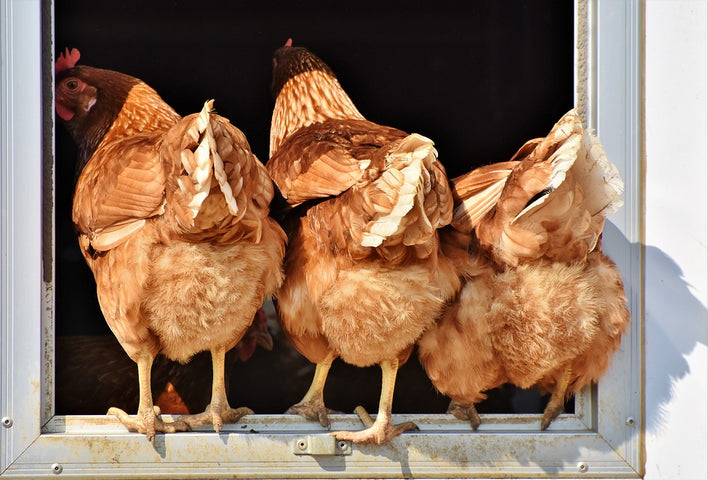Did you know chickens are prey animals? This means they have to look out for themselves! For this reason, they are conditioned to hide their stress to prevent potential predators from thinking they are an easy target. These behaviors, which are very natural for chickens, make it hard for us to detect stress in our backyard flocks.
Chickens experience both acute (temporary) stress and chronic (long-term) stress. The more frequent and severe the acute stress is, the more likely it is to turn into chronic stress.
Stress has a direct impact on chickens' health, and so supporting chickens during these times can prevent the current stress from getting worse and keep them healthier overall. The faster we can detect our flock's stress and be aware of what causes it, the sooner we can reduce it. Here are some stressors to consider when keeping an eye on your flock:
1) Egg laying. It takes about 26 hours for a hen to lay an egg. Whether she lays an egg each day depends on internal cues, external cues, and the environment. If these factors are not right for the hen to perform her egg laying routine, then the hen can become stressed and not lay an egg.
2) Predators. A potential predator attack is a stressful event for a chicken. A predator is more than just something that can attack a chicken! It can also be an animal that can harm a hen’s eggs. For example, when your hens see a hawk flying, a snake in the yard, or a racoon near the coop, they experience a stress response. Sometimes, humans can also be interpreted as predators.
3) Social Hierarchy. Chickens' social hierarchy is called a pecking order. This means there is a dominant hen that will make sure she gets the best of whatever is in her community. She will lay her egg in the best area; perch at the highest point; and eat, drink, and get treats first. That means the hen at the bottom of the pecking order will perch lower to the ground and often be last to eat, drink, and receive treats. The hen on the lowest pecking order will usually be the most skittish.
These social structures can create stress in two different ways. First, the hen at the bottom of the pecking order may be stressed due to receiving the “leftover” feed and being the most vulnerable to predators during roosting. Second, the dominant hen is always at risk of losing her top position which may cause some stressful fighting to occur.
4) Temperature. At high temperatures (Above 85F) and high humidity, hens experience heat stress. Chickens are less prone to cold stress but can still experience it at temperatures lower than 61F. Both temperature stressors negatively affect your hen’s health and decrease egg production.
When stress become compounded, it can create problems for your flock. For example, if your hens are laying eggs, a predator was recently seen near your coop, and the temperature is above 85F, your hens are likely experiencing moderate stress. If you also witness your hens having diarrhea, and the temperature is closer to 95F with high humidity, then this may be considered severe stress.
